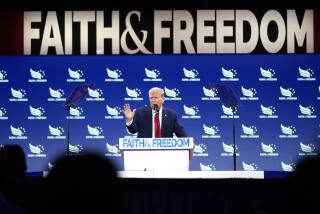Exile Ends for Mainline Churches : Protestants: The leaders meet for 45 minutes with President Clinton. During the previous 12 years, they were virtually frozen out of the White House, with access going to the religious right.
- Share via
WASHINGTON — Ending 12 years of political exile, leaders of the nation’s mainline Protestant and Orthodox churches held a 45-minute closed-door session Thursday with President Bill Clinton at the White House.
The Rev. Joan Brown Campbell, general secretary of the National Council of Churches, said Clinton told the group, “I’ve been so criticized by the religious right community, it’s good to have religious people who understand what I’m trying to do.”
In return, the 38 religious leaders, representing the 32 denominations in the council and, by extension, their 47 million members, pledged to support the President, especially in his fight to win passage of his economic reform package.
Campbell said the delegation included a host of heads of denominations, along with ecumenical officials and young people new to the national religious scene.
Describing the meeting as cordial and instructive, she said, “We told him, ‘Yes, Mr. President, we will walk with you on this journey.’ ”
Clinton also promised the leaders that the session was only the first in a series of meetings between the Clinton Administration and mainline religious leaders.
“This is a new day,” the council president, the Rev. Syngman Rhee, told reporters after the meeting.
During the Reagan and Bush administrations, mainline Protestants were virtually frozen out of the White House, with access going to leaders of the religious right--the Moral Majority’s Jerry Falwell and Republican activist Pat Robertson, for example.
In fact, council officials said the meeting was the largest gathering of top mainline church officials with a President since the Lyndon B. Johnson Administration. Although the council and its member churches often worked with the Carter Administration on issues, there was never a meeting like Thursday’s when leaders of so many different denominations were involved.
In the session, church officials raised a host of issues, most connected to the council’s work in rebuilding the cities and aiding the poor and the jobless--issues on which the church leaders and Clinton generally agree.
“The President sees us as a resource,” Campbell said.
Presiding Bishop Edmond Browning of the Episcopal Church pressed Clinton on the Middle East issue, telling him “the Palestinians have been marginalized” in the Middle East peace process.
Browning said he “asked the President to consider appointment of an ‘eminent persons’ group” to visit the Israeli-occupied territories of the West Bank and Gaza to report on conditions there.
“He was responsive and said he would raise it up with his advisers,” Browning said.
In addition, the delegation delivered Clinton a private letter from the patriarch of the Russian Orthodox Church asking the President to consider visiting the church if the April summit meeting between Clinton and Russian President Boris Yeltsin is switched to Moscow.
Officials said that Clinton told them that “if he goes he would be happy to accept” and that he would not want “to visit a church that is a museum” but would want to worship, as well.
Some topics were avoided. They included issues on which the churches disagree among themselves, such as abortion and the role of gays in the military.
Also avoided, said Campbell, were issues on which the churches and Clinton disagree, such as his recent appointment of Boston Mayor Raymond Flynn to be the U.S. envoy to the Vatican. Some U.S. church leaders consider official ties between the U.S. government and the Vatican to be inappropriate.
The council also refrained from discussing candidates for Supreme Court justice. “It would not be appropriate for us as a body” to consult with the President on specific names, Campbell said.
Bishop Melvin Talbert, secretary of the Council of Bishops of the United Methodist Church, called the meeting marvelous and said Clinton was “a man of great integrity and spiritual strength.”
More to Read
Sign up for Essential California
The most important California stories and recommendations in your inbox every morning.
You may occasionally receive promotional content from the Los Angeles Times.













